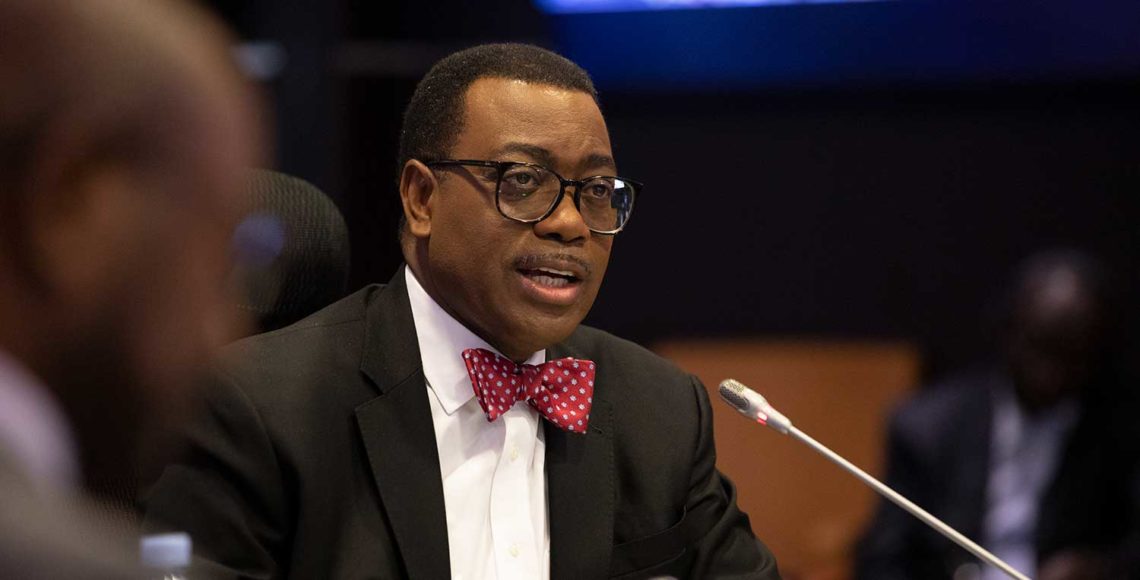President African Development Bank (AfDB), Dr Akinwumi Adesina, said its fund, the African Development Fund (ADF), would introduce a Climate Action Window to mobilise between $4billion to $13billion for climate adaptation for ADF countries.
In a statement from the AfDB on Tuesday, Adesina said this at the Africa Climate Adaptation Summit which took place in Rotterdam, Netherlands on Monday.
The ADF countries are Benin, Burkina Faso. Burundi, Central African Republic, Chad, Comoros, Democratic Republic of Congo, Eritrea, Ethiopia, The Gambia, Guinea, Guinea-Bissau, Liberia, Madagascar, Malawi, Mali, Mozambique, Niger and Rwanda.
Others are Sierra Leone, Somalia, South Sudan, Sudan, Tanzania, Togo, Uganda, Zimbabwe, Côte d’Ivoire, Djibouti, Ghana, Lesotho, Mauritania, Sao Tome & Principe, Cameroon, Kenya, Senegal, Zambia and Nigeria.
The AfDB president said the fund mobilised would be used to support 20 million farmers with access to climate resilient agricultural technologies, 20 million farmers and pastoralists access to weather-indexed crop insurance.
He added it would revive one million hectares of degraded land, and provide renewable energy for about 9.5 million people.
He, however, stressed the need for financing to tackle the challenge of climate change in Africa and called on developed countries to provide the 100-billion-dollar annual climate finance as commitments made to developing countries.
“The African Development Fund’s 16th replenishment now presents such a unique opportunity! Never have the stakes been so high for Africa’s low income and fragile states that depend on the ADF.
“Nine of the 10 countries most vulnerable to climate change in the world are in sub-Sahara Africa and all of them are ADF countries. Yet, ADF countries do not have access to global climate finance.
“Commitments made by developed countries to provide 100 billion dollars annually in climate finance for developing countries are long overdue. Africa can no longer wait.
“This is the time to support the African Adaptation Acceleration Programme. This is the time to support ADF 16th replenishment. This is the time to support the Climate Action Window of ADF-16,” he said.
Adesina stated that Africa received only three per cent of global climate financing, adding that if the trend continued, the continent’s climate financing gap would reach 100 billion dollars to 127 billion dollars per year through 2030.
“The current climate financing architecture is not meeting the needs of Africa. New estimates by the African Economic Outlook of the AfDB shows that Africa will need between 1.3 and 1.6 trillion dollars between 2020-2030, or 118 billion dollars to 145 billion dollars annually. This will enable the continent to implement its commitments to the Paris Agreement and its nationally determined contributions.
“The African Adaptation Acceleration Program (AAA-P) is Africa’s own programme, supported by African Heads of State, to mobilise more resources for climate change, to advance the objectives of the African Adaptation Initiative,” he explained.
He further said the bank and the Global Centre on Adaptation were mobilising 25 billion dollars for the programme, to which the AfDB had committed 12.5 billion dollars.
He explained that the AAA-P had an upstream facility at the GCA and a downstream facility at the bank.
“The upstream facility, which needs capitalisation of 250 million dollars, will help to mainstream solutions on climate adaptation.
“The downstream facility at the bank, to be capitalised at 1.75 billion dollars, will help leverage additional adaptation finance by a factor of four times, to deliver seven billion dollars of additional adaptation finance.
“GCA and the AfDB are already showing very good results on the AAA-P. The AAA-P upstream facility at the GCA has helped to generate three billion dollars of mainstreamed climate adaptation investments by the bank, from agriculture, to energy, transport, water, and sanitation,” he added.
He thanked the UK for its delivery on the promise of GBP 20 million for the upstream facility at the GCA, which had been fully disbursed, adding that the bank would fulfill its commitment in mobilising 12.5 billion dollars.
The ADF was established in 1972 and became operational in 1974 as a separate legal international organisation part of the bank.
The fund is supported by 32 donors, including the bank, who replenish the fund every three years.
The international development partner country officials (deputies) of the ADF and the senior management of the AfDB would meet in Dakar, Senegal, to discuss the fund’s 16th replenishment (ADF-16) from Sept. 15 to 17.





